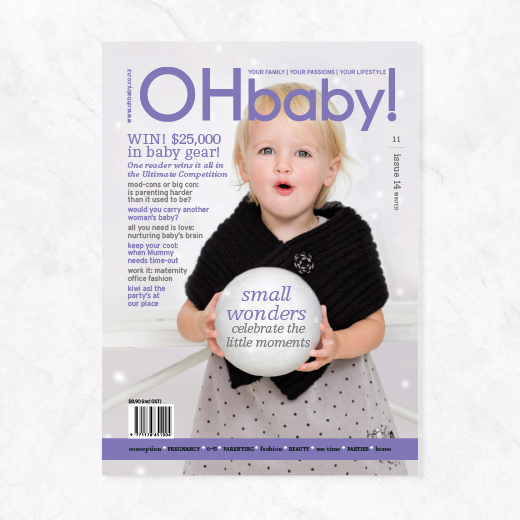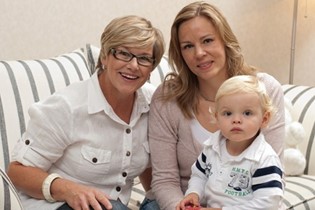Surrogacy

Surrogacy has been around since Biblical times but surrogacy by IVF is now a carefully controlled process that can lead to happy outcomes for both parties, writes our fertility expert Dr Richard Fisher. Surrogacy has attracted more attention lately with celebrities such as Nicole Kidman and Sarah Jessica Parker using it to add to their families, but it's certainly not new. The Old Testament tells the story of Hagar who carried a baby for Abraham's wife Sarah. Given that it was unlikely that insemination occurred in a clinical context, we can be sure the ethics of such a natural surrogacy were the source of considerable debate even then.
There are two forms of surrogacy - natural and IVF. Natural surrogacy is when a woman carries a child for another couple but the egg is her own. IVF surrogacy occurs when the embryo, which is implanted into the uterus of the surrogate, has been formed in a laboratory from the gametes (eggs and sperm) of the commissioning parents. This is now a much more common scenario.
Conception demands three things: an egg, a sperm (commonly quite a lot of them) and a uterus in which the embryo can implant, be nurtured and grow to maturity and delivery. Most couples seek surrogacy when the woman is unable to carry a pregnancy because of the absence or malformation of her uterus. The couple will use their own eggs and sperm in the process of IVF to create an embryo which is then implanted in another woman who volunteers the use of her uterus. This can be either in a non-commercial or altruistic circumstance or in a commercial arrangement.
Surrogacy and the law
Legally, all surrogacy in New Zealand must be non-commercial. It can be either natural or by IVF and by regulation either the sperm or the egg must come from the commissioning couple. It is by no means a simple, easy option. If you use surrogacy through a reproductive medicine clinic such as Fertility Associates, you must go through a process of ethical oversight by the national Ethics Committee on Assisted Reproductive Technology (ECART).
The committee will look at all parties' medical and social histories and requires evidence that all have received independent legal advice. Inevitably, this process has intrinsic tensions associated with it. Many commissioning couples, and indeed potential surrogates, wonder why a government committee should be able to regulate what they can do with their lives. On the other hand, some in our society, who have social or ethical concerns, believe that even this requirement is not strict or limiting enough to meet their objections.
'Womb to rent'
As with many things in reproductive medicine a superficial view from the outside is often incorrect. Characterising surrogacy as being "a womb to rent" or an exploitation of one person by another is usually far from the truth. The emotional context of surrogacy is such that almost no one would contemplate using this as a way to get around the inconvenience of pregnancy and delivery.
Our social and cultural histories are so entwined with concepts of conception and parenthood that the emotional complexities of surrogacy are impossible to take superficially or lightly.
The number of cases of IVF surrogacy coming through Fertility Associates varies year by year. The numbers of applications to ECART is always greater than the number of people who actually go on to have treatment as well. In 2009 and 2010 we averaged six surrogacy cycles a year. While the requests for surrogacy here are small, the potential social impact is large for all involved, especially the child. A lot of time and thought has been invested in establishing an environment in which the interests of all parties are protected as best they can be.
It is easy to see surrogacy as being a very one-sided deal with the commissioning couple being the only ones who gain significantly from it as they are ultimately delivered a child. But for most surrogates there is also much to gain from knowing their actions have ensured both the delivery of a healthy child and the joy to a couple for whom parenthood would otherwise not occur. Most commonly surrogates come from among the couple's own family and friends.
Some women do and can approach Fertility Associates to volunteer to be a surrogate in much the same way women volunteer to donate their eggs. Fertility Associates does not actively seek surrogates for couples and we do not act as a broker, but occasionally we will act as an introduction agency. The psycho-social complexities around surrogacy are such that although some women do approach us about altruistic surrogacy the number of people who end up doing it is limited.
The altruistic nature of surrogacy in New Zealand certainly softens the debate about wombs for rent, which occurs in some other countries. The strictness of our law doesn't even allow a payment which might reasonably be made to cover the costs of some time off work, for instance, or for recognition of inconvenience. Immediate expenses, such as transport costs, are allowed but no "valuable consideration" (the legal term) otherwise. There are significant penalties, including fines and time in jail, for any person who breaks the law. Arguments internationally about commercial surrogacy vary according to their circumstances. In the USA, where commercial surrogacy is the norm, it is usually about the co-modification of reproduction as the ethical and legal circumstances ensure that the potential surrogate is well informed, well paid and legally protected. The prevailing view is that a well-informed consenting adult is capable of giving informed consent and can make a reasoned judgement as to the value of service she provides.
Exploitation
India has become a very popular place to seek surrogates and here the debate has primarily been around exploitation. Many surrogates are poor, some are illiterate and they are potentially open to exploitation. However, the counter argument by those involved says that the US$5000 paid to the surrogate is the equivalent of 10 years salary for many of their husbands and that, providing their decision to become a surrogate is an informed one, the exploitation is not of the surrogate but of her husband who is being paid one dollar a day to work in a western factory. The arguments are of course much more complex than this and the Indian government is bringing in legislation to regulate the practice of surrogacy in an endeavour to constrain the worst excesses. India has until now been the country of choice for gay men who use both donor eggs and surrogacy to create a child. The new legislation will require the commissioning couples to be legally married.
Even in the litigious world of the US with its structure of surrogate brokers, competitive clinics and complex legal arrangements, there have been very few circumstances in which surrogacy arrangements have gone awry. Mostly, if there have been problems, they are in the area of natural surrogacy not IVF. Where the surrogate is also the biological mother, the propensity for regret and change of mind in terms of relinquishment seems so much greater.
In New Zealand, the Status of Children Amendment Act defines the legal circumstances. No matter where the egg and sperm come from, the surrogate who has the baby is the legal mother until such time as she formally gives up the child for adoption.
All the prerequisites for adoption need to be met including Child, Youth and Family (CYF) screening and both parties need to have had independent and formal legal advice. Within this structure some participants make further informal agreements about their expectations of each other, welfare in pregnancy and future contact. Surrogacy arrangements are not enforceable in law and consequently they involve a great deal of trust and a need to be absolutely clear of the arrangements before entering this potentially complicated relationship.
Although natural surrogacy has been long practised there is very little information about the long-term emotional welfare of any of the parties. The little evidence that is available suggests that the outcomes are usually entirely satisfactory. The few cases, particularly in the US, that have hit the headlines with legal arguments, suggest that the incidence of serious problems is very small. Central to all this, of course, is the welfare of the child and current evidence is very reassuring.
IVF surrogacy, where the child is the full biological child of the commissioning couple, appears to be less problematic. But given this is a relatively new procedure, I don't think we should make this assumption until some time has passed and the children conceived, carried and nurtured in this way are old enough to express their own opinion. Until then it will behove reproductive medicine clinics involved in the area to continue to handle it with care.
The process of surrogacy, the requirements around ethical consent, the legal hurdles that need to be overcome and the involvement of so many people in establishing even a potential surrogate cycle make the process a daunting one for commissioning couples. It is not an easy way to have a child. Those who undertake surrogacy on all sides in New Zealand are certainly courageous and inevitably are emotionally affected by it.
Just because we can do it doesn't always mean that it is wise. Surrogacy is an area in which wisdom and careful, conservative advice is critical to the long-term welfare of all the parties. Although to the commissioning couples the hurdles required to end up with surrogacy are high, it does, I hope, mean that they are well informed and legally protected, I also hope, on the other hand, that the broader community is comforted that the process is as safe as it can be while allowing couples who otherwise could not become parents to do so.
More information about INFERTILITY here
|
Richard Fisher (FRCOG, FRANZCOG, CREI) together with Freddy Graham established Fertility Associates in 1987. He is NZ's foremost medical spokesperson on matters of reproductive health and has been an advocate throughout his career for better access to care for couples with infertility. He has four children and is married to Leigh, without whom he could never have practised medicine with the enthusiasm and commitment that he has. Visit www.fertilityassociates.co.nz to find out more about fertility and treatments. |

AS FEATURED IN ISSUE 14 OF OHbaby! MAGAZINE. CHECK OUT OTHER ARTICLES IN THIS ISSUE BELOW

















